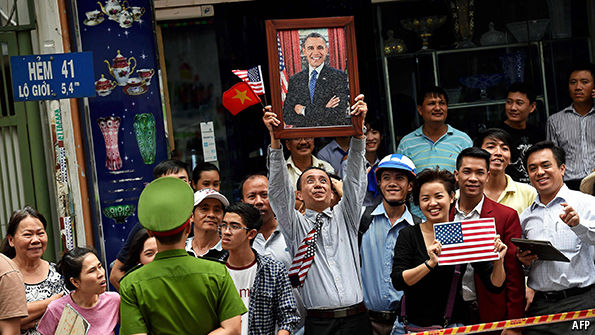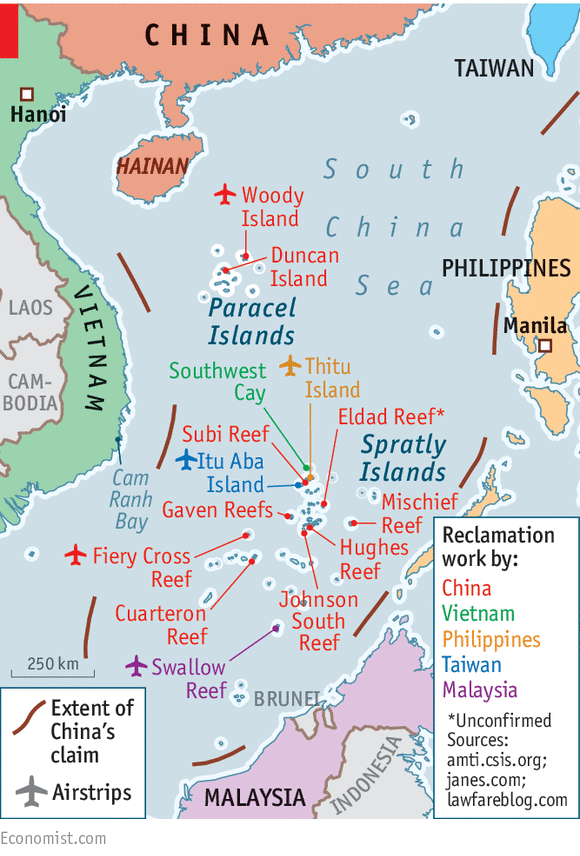
TRANGNHÀ VNY2K
 TRANGCHỦ TRANGCHỦ  Ghidanh
Ghidanh  Ðăngnhập
Ðăngnhập  Danhsách thànhviên
Danhsách thànhviên |
 Xem thưriêng
Xem thưriêng  Banquảntrị
Banquảntrị  Tìmkiếm
Tìmkiếm  Thắcmắc chung
Thắcmắc chung |

TRANGNHÀ VNY2K |
|
| America and Vietnam: Pull the other one | |||
| |||
| Tácgiả |
| ||||||||||||||||
|
America and Vietnam: Pull the other one
America’s president plays the Vietnam card  BARACK OBAMA fooled no one this week when, having announced that America was lifting its embargo on selling weapons to Vietnam, he denied that the decision was “based on China or any other considerations”. It was a tactful fib, to portray the move as merely part of Mr Obama’s legacy-building mission of reconciliation with historic enemies, to be followed days later by a historic visit to the site of America’s atom-bombing of Hiroshima. But at a time of increased tension in the South China Sea, where Vietnam is among the countries disputing territory with China, America’s policies there are bound to be seen in a different context. The headline in Global Times, a fire-breathing Chinese tabloid, read simply: “Washington uses past foe to counter China”. The American president made his announcement a few hours into his first state visit to Vietnam, following a meeting with the country’s new president, Tran Dai Quang, in Hanoi. Official enthusiasm was mirrored in the thick crowds lining the streets in the capital and in Ho Chi Minh City to greet Mr Obama, whose visit between May 23rd and 25th was only the third by an American leader since the end of the Vietnam war in 1975. His star power contrasted with the indifference most Vietnamese show for the stiff apparatchiks of the ruling Communist Party. Locals in Hanoi gawped at Mr Obama tucking into bun cha, a cheap meal of grilled pork and rice noodles bought from a street stall. The end of the arms ban will have little immediate impact. America had already twice loosened it, first in 2007 and again in 2014, allowing the sale of needed patrol vessels. It will take years for the Vietnamese, short on cash and largely reliant on Russian weaponry, to integrate American hardware. Moreover, weapon sales to Vietnam (like to anywhere else) will still need to be approved case by case, and the first purchases are likely to be of relatively inoffensive systems, such as radar. China’s press has warned that America risks turning the region into a “tinderbox of conflicts”, yet its diplomats, not normally slow to accuse America of stoking tensions, played down the decision. A spokeswoman for the foreign ministry welcomed the normalisation of ties between Vietnam and America, and painted the arms ban as a kooky anachronism. America’s move is partly a sop to conservative factions within Vietnam’s Communist Party in need of reassurance. Behind this week’s smiles they still fret that America harbours hope of overthrowing the party. Bigwigs in government feel bounced into their friendship with America by virulent anti-Chinese sentiment among ordinary Vietnamese, some of whom accuse the cadres of going soft on Vietnam’s overbearing northern neighbour. Trust earned by dropping the embargo might eventually gain advantages for America’s own armed forces, such as a return to Cam Ranh Bay, once an American naval base on the south-eastern coast. America had previously insisted that lifting the embargo would depend on Vietnam’s progress on human rights, which even Mr Obama admits has been only “modest”. The regime’s thuggishness makes even a largely symbolic concession hard to swallow. The party was seen to have eased up on critics during 2015, when it was negotiating access to the American-led Trans-Pacific Partnership (TPP), a free-trade deal—but it has since reverted to form, and its new leadership, reshuffled in January, contains several former secret policemen. Mr Obama’s arrival in Vietnam coincided with a ludicrous parliamentary “election”, boasting a 96% turnout, and with a crackdown on environmentalists who have been gathering in the cities to protest about polluted canals and seas. The authorities even sabotaged Mr Obama’s efforts to meet critics of the party by briefly detaining several campaigners whom the president had invited to his hotel for a chat. China plays the Gambia gambit Boosters say that improving Vietnam’s human-rights record is bound to be a long slog, and that gaining the regime’s trust is a prerequisite. They say that arms sales are far from America’s only bargaining chip: the terms of the TPP, for example, oblige Vietnam to begin tolerating independent unions, a reform that could loosen the Communists’ monopoly on public life. But that deal will have no impact if, as seems all too possible, America’s Congress refuses to ratify it.  So Mr Obama is taking the long-term view that closer partnership with Vietnam is worth sacrificing some principles for. America and its regional friends are alarmed by China’s forcefulness in the South China Sea—notably its building boom, turning disputed rocks and reefs into artificial islands, which may well, despite Chinese denials, become military bases. Both diplomacy and American displays of might have failed to stop this. America currently has an aircraft-carrier battle group in the South China Sea to remind the world of its military strength. To Chinese protests, it has sent ships and planes close to Chinese-claimed rocks and reefs. Meanwhile, the Philippines has challenged China’s territorial claims at an international tribunal in The Hague, which is expected to rule soon. China has said it will ignore the ruling. The Philippines’ new president, Rodrigo Duterte, has not made clear how he would react to a decision in his country’s favour. Although nobody expects America and China to go to war over some remote rocks and man-made islands, an accidental clash in or over the South China Sea remains a risk. On May 17th Chinese fighter jets dangerously intercepted an American reconnaissance plane over the sea. China denies its planes did anything provocative. China does seem to worry about its image, however. Its foreign minister, Wang Yi, recently toured the smallest South-East Asian countries—Brunei, Cambodia and Laos—and announced that China had reached “consensus” with them on handling disputes in the sea. This was news to the countries concerned, and alarmed their fellow members of the Association of South-East Asian Nations, who saw a blatant attempt to divide them. China has also lobbied G7 countries in the hope that the statement their leaders issue on May 27th after their summit in Japan will not scold China over the South China Sea. Already China’s newest diplomatic partner, the Gambia, in distant west Africa has, bizarrely, confirmed China’s “indisputable sovereignty” over the sea. So that’s that, then. Source: www.economist.com/news/asia/21699475-americas-president-plays-vietnam-card-pull-other-one - Ngườihiệuđính: dchph vào ngày May.28.2016, 08:05 am ----------------------------- | ||||||||||||||||
 May.28.2016 08:04 am May.28.2016 08:04 am
|
| ||||||||||||||||
| Ðềtài nầy đãcó 0 bàitrảlời kểtừ May.28.2016. | |||||||||||||||||
|
| |  Xếp đềtài nầy vào mục cần theodõi Xếp đềtài nầy vào mục cần theodõi  Email cho ngườiquen Email cho ngườiquen  In đềtài nầy ra giấy In đềtài nầy ra giấy
|
|